Zoom
Trash

Uld robots become too cute for comfort? 23 October 2014Last updated at 19:09 ET By Radek Boschetty The Forum, BBC World Service Humans instinctively respond to the human-like features of many robot designs Would you share your innermost secret with a robot?
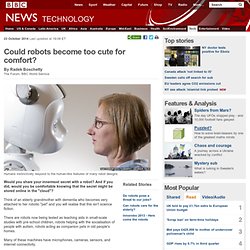
Stephen Hawking Predicts Digital Mind Upload Possible. Stephen Hawking predicts that digital mind uploading may be possible, just not anytime soon.

Who ordered *that*? "Your papers, please.
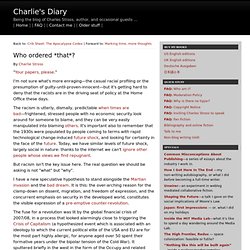
" I'm not sure what's more enraging—the casual racial profiling or the presumption of guilty-until-proven-innocent—but it's getting hard to deny that the racists are in the driving seat of policy at the Home Office these days. The racism is utterly, dismally, predictable when times are bad—frightened, stressed people with no economic security look around for someone to blame, and they can be very easily manipulated into blaming others. It's important also to remember that the 1930s were populated by people coming to terms with rapid technological change-induced future shock, and looking for certainty in the face of the future. Today, we have similar levels of future shock, largely social in nature: thanks to the internet we can't ignore other people whose views we find repugnant.
But racism isn't the key issue here. Inductrack III for superefficient leviation and movement of shipping containers. What Will Human Cultures Be Like in 100 Years? I disagree.
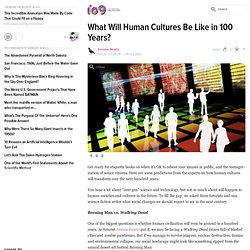
I think there's something to be said for looking at the whole of human culture, especially today with growing globalization. But more than that, despite our cultural segmentation, I think that there has always been something, even between the East and the West, that boils down to being generally "human. " I disagree that there is no "human culture". The advent of mass media has ushered in an era for more globalized forms of culture.
What is popular in S. One crossover hit between two cultures doesn't a global culture make. Futures of Human Cultures. My friend Annalee Newitz, editor at io9.com, asked me a short while ago for some thoughts on the possible futures of human cultures.
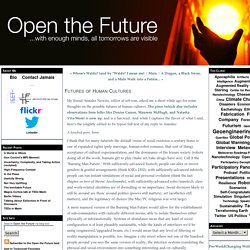
The piece (which also includes observations from folks like Denise Caruso, Maureen McHugh, and Natasha Vita-More) is now up, and is a fun read. And while I captures the flavor of what I said, here's the (slightly edited to fix typos) full text of my reply to Annalee: A hundred years, hmm. I think that for many futurists the default vision of social existence a century hence is one of expanded rights (poly marriage, human-robot romance, that sort of thing), acceptance of cultural experimentation, and the dominance of the leisure society (robots doing all of the work, humans get to play/make art/take drugs/have sex). Call it the "Burning Man Future. " The Fuzzy Now. Thought experiment: imagine you've been taken, somehow, and dropped into a big city in another place, with comparable technological and economic development, somewhere you don't speak the language.
A new horizon of sex and gender. If you only listen to one radio programme this week, make it the latest edition of BBC Radio 4′s Analysis on the under-explored science of gender.

The usual line goes that ‘sex is biological while gender is social’ – meaning that while genetics determines our sex, how masculine or feminine we are is determined by specific cultural practices. It turns out to be a little more complicated than this. It has long been known (although frequently forgotten) that typical sex markers like body shape and genitalia are actually quite diverse to the point of being ambiguous in some. Similarly, while genetics is considered the ultimate arbiter of sex with XX indicating female and XY indicating male – XYY, XXY and XXX are surprisingly common. On the other hand, there is evidence that some gender-related behaviours may be related to the biology of development and not solely to cultural factors. Future of Work: Workforce automation, old ideas with new implementation is not the answer. David Saintloth March 19, 2013 A recent article in the Wall Street Journal covers the topic of increasing interest by corporations to gain high resolution into the activities that workers are performing on the job.
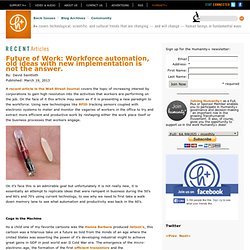
On the face of it this article may seem as if it is presenting a new paradigm to the workforce. Using new technologies like RFID tracking sensors coupled with electronic systems to meter and monitor the vagaries of workers in the office to try and extract more efficient and productive work by reshaping either the work place itself or the business processes that workers engage. What’s In Soylent : Mostly Harmless. (this is the follow up to "How I Stopped Eating Food") Edit July 2013: This was a prototype.
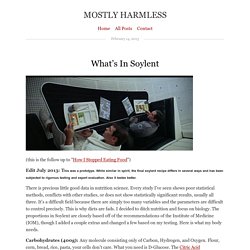
While similar in spirit, the final soylent recipe differs in several ways and has been subjected to rigorous testing and expert evaluation. Also it tastes better. There is precious little good data in nutrition science. Every study I've seen shows poor statistical methods, conflicts with other studies, or does not show statistically significant results, usually all three. How I Stopped Eating Food : Mostly Harmless. Food is the fossil fuel of human energy.
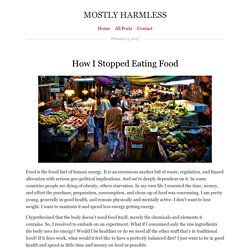
It is an enormous market full of waste, regulation, and biased allocation with serious geo-political implications. Is the Popular 'Paleo Diet' a Bunch of Baloney? Photo Credit: Robyn Mackenzie/ Shutterstock.com March 22, 2013 | Like this article?
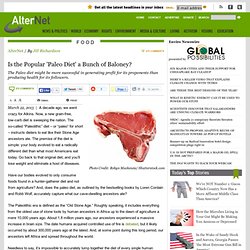
Join our email list: Stay up to date with the latest headlines via email. A decade ago, we went crazy for Atkins. A World Waiting On Post-Scarcity. Harry J. Bentham March 20, 2013.
Death.